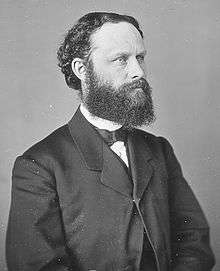John Winthrop Chanler

John Winthrop Chanler (September 14, 1826 – October 19, 1877) was a prominent New York lawyer and a U.S. Representative from New York.
Life and career
John Winthrop Chanler was born in New York City on September 14, 1826, the son of John White Chanler and Elizabeth Shirreff Winthrop. His mother was a great-great-granddaughter of Wait Winthrop and Joseph Dudley and a great-great-great granddaughter of Peter Stuyvesant.
Chanler received his early education from private tutors, and graduated from Columbia College of Columbia University in 1847. He attended the University of Heidelberg, studied law, and was admitted to the New York State Bar in 1851.
A Democrat affiliated with Tammany Hall, Chanler was member of the New York State Assembly (New York Co., 10th D.) in 1858 and 1859. He was nominated for New York State Senate in 1860 but declined. He was an unsuccessful candidate for election in 1860 to the Thirty-seventh Congress.
Chanler was elected as a Democrat to the Thirty-eighth, Thirty-ninth, and Fortieth United States Congresses, serving from March 4, 1863 to March 3, 1869.
His term in Congress was notable for his censure on May 14, 1866 for an insult to the House of Representatives. The censure stemmed from a resolution he introduced expressing support for the vetoes of President Andrew Johnson, in which Chanler called acts of Congress vetoed by Johnson "wicked and revolutionary," and called House members who overruled the vetoes "malignant and mischievous."[1]
Family
John married into the prominent Astor family of New York. His wife, Margaret Astor Ward (1838–1875), was the daughter of Samuel Cutler Ward and Emily Astor.
The couple had ten children, including politicians William Astor Chanler and Lewis Stuyvesant Chanler, as well as the artist Robert Winthrop Chanler. Their third daughter Margaret Livingston Chanler served as a nurse with the American Red Cross during the Spanish–American War.[2]
John and Margaret's eldest son John Armstrong "Archie" Chanler married and later divorced novelist Amélie Rives Troubetzkoy.[3]
Margaret died of pneumonia in December 1875 shortly after attending the funeral of her maternal grandfather.[4]
Death and burial
John Winthrop Chanler died at his "Rokeby" estate in Barrytown, New York, also of pneumonia, on October 19, 1877 and was interred with his wife in the Trinity Church Cemetery in New York City.
See also
- United States Congress. "John Winthrop Chanler (id: C000302)". Biographical Directory of the United States Congress.
- John Winthrop Chanler at Find a Grave
References
- ↑ Asher Crosby Hinds, Hinds' Precedents of the House of Representatives of the United States, Volume 2, 1907, page 798
- ↑ "Margaret Astor Chanler, Heroine of Porto Rico," Milwaukee Journal, Sept 8, 1898, p. 5.
- ↑ Donna M. Lucey, Archie and Amélie: Love and Madness in the Gilded Age. New York: Harmony Books, 2007. ISBN 1-4000-4852-4.
- ↑ Thomas, Lately. A Pride of Lions: The Astor Orphans; the Chanler Chronicle, W. Morrow, 1971.
| New York Assembly | ||
|---|---|---|
| Preceded by James S. Sluyter |
New York State Assembly New York County, 10th District 1858–1859 |
Succeeded by Joseph P. Cooper |
| United States House of Representatives | ||
| Preceded by Elijah Ward |
Member of the U.S. House of Representatives from New York's 7th congressional district 1863–1869 |
Succeeded by Hervey C. Calkin |
![]() This article incorporates public domain material from the Biographical Directory of the United States Congress website http://bioguide.congress.gov.
This article incorporates public domain material from the Biographical Directory of the United States Congress website http://bioguide.congress.gov.